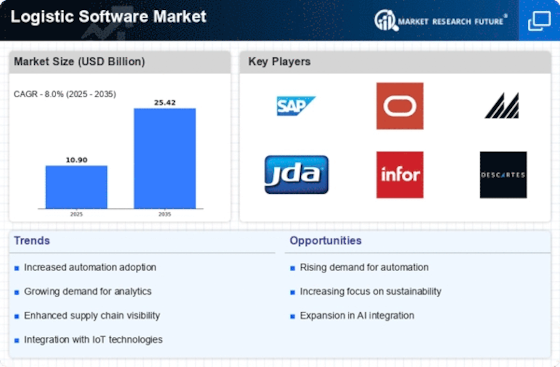Market Trends
Key Emerging Trends in the Logistic Software Market
The logistic software market has been experiencing significant trends and shifts in recent years, reflecting the dynamic nature of the logistics industry. One prominent trend is the growing adoption of cloud-based logistics solutions. Companies are increasingly recognizing the benefits of cloud technology, such as scalability, flexibility, and cost-effectiveness. Cloud-based logistics software enables real-time collaboration, data accessibility, and seamless integration with other business systems, driving operational efficiency and responsiveness. Another key trend is the integration of advanced technologies like AI and ML in logistics software. These technologies empower logistics providers to analyze vast amounts of data, optimize route planning, and enhance decision-making processes. Predictive analytics, powered by AI and ML, enables companies to anticipate demand, optimize inventory levels, and reduce transportation costs.
This trend is not only streamlining logistics operations but also improving overall supply chain visibility and resilience. The rise of e-commerce has also been a major driver in shaping market trends for logistics software. With the surge in online shopping, there is an increased demand for robust and agile logistics solutions to manage the complex supply chains associated with e-commerce. Logistics software that supports features like real-time tracking, inventory management, and last-mile delivery optimization has become crucial for businesses striving to meet customer expectations in the fast-paced world of online retail. Moreover, sustainability and environmental concerns have become pivotal factors influencing market trends in logistics software. Companies are placing greater emphasis on green logistics practices to reduce their carbon footprint and meet regulatory requirements.
As a result, there is a growing demand for logistics software that facilitates efficient route planning to minimize fuel consumption, optimize vehicle loading to reduce emissions, and supports eco-friendly transportation modes. The importance of data security and privacy has also become a top priority in the logistics software market. With the increasing reliance on digital platforms and the exchange of sensitive information within supply chains, there is a heightened need for robust cybersecurity measures. Logistic software providers are investing in advanced security features, encryption technologies, and compliance with data protection regulations to ensure the integrity and confidentiality of the data being processed within their systems. Furthermore, the trend of modular and customizable logistics software solutions is gaining traction. Businesses are seeking software that can be tailored to their specific needs, allowing them to add or remove features as their requirements evolve. This flexibility not only enhances the user experience but also enables companies to adapt quickly to changing market dynamics and seize new opportunities.


















Leave a Comment